Unilever's Management and Operations: A Comprehensive Report, Unit 4
VerifiedAdded on 2020/10/22
|19
|6029
|468
Report
AI Summary
This report provides a comprehensive analysis of Unilever's management and operations. It defines the roles of managers and leaders, highlighting the differences between management and leadership. The report explores various management and leadership theories, such as Adair's model, contingency theory, and situational leadership, and applies them to different organizational situations, including conflict resolution and rapid changes in the business environment. It evaluates the strengths and weaknesses of different leadership and management approaches, including scientific management. The report also examines key operational approaches, their value, and the impact of external business environment factors on decision-making. Furthermore, it provides recommendations for improving operational efficiencies and overall management effectiveness within Unilever.
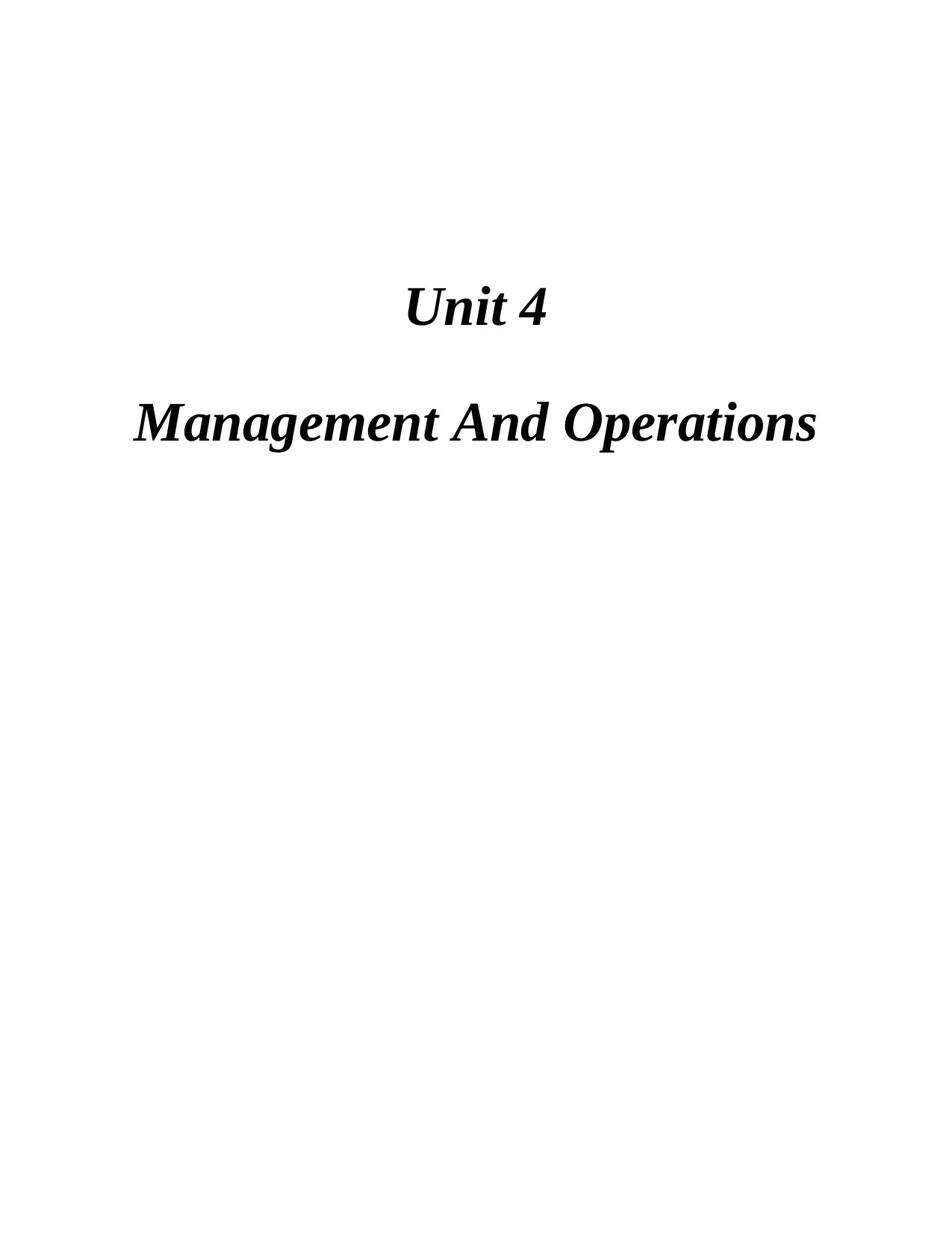
Unit 4
Management And Operations
Management And Operations
Paraphrase This Document
Need a fresh take? Get an instant paraphrase of this document with our AI Paraphraser
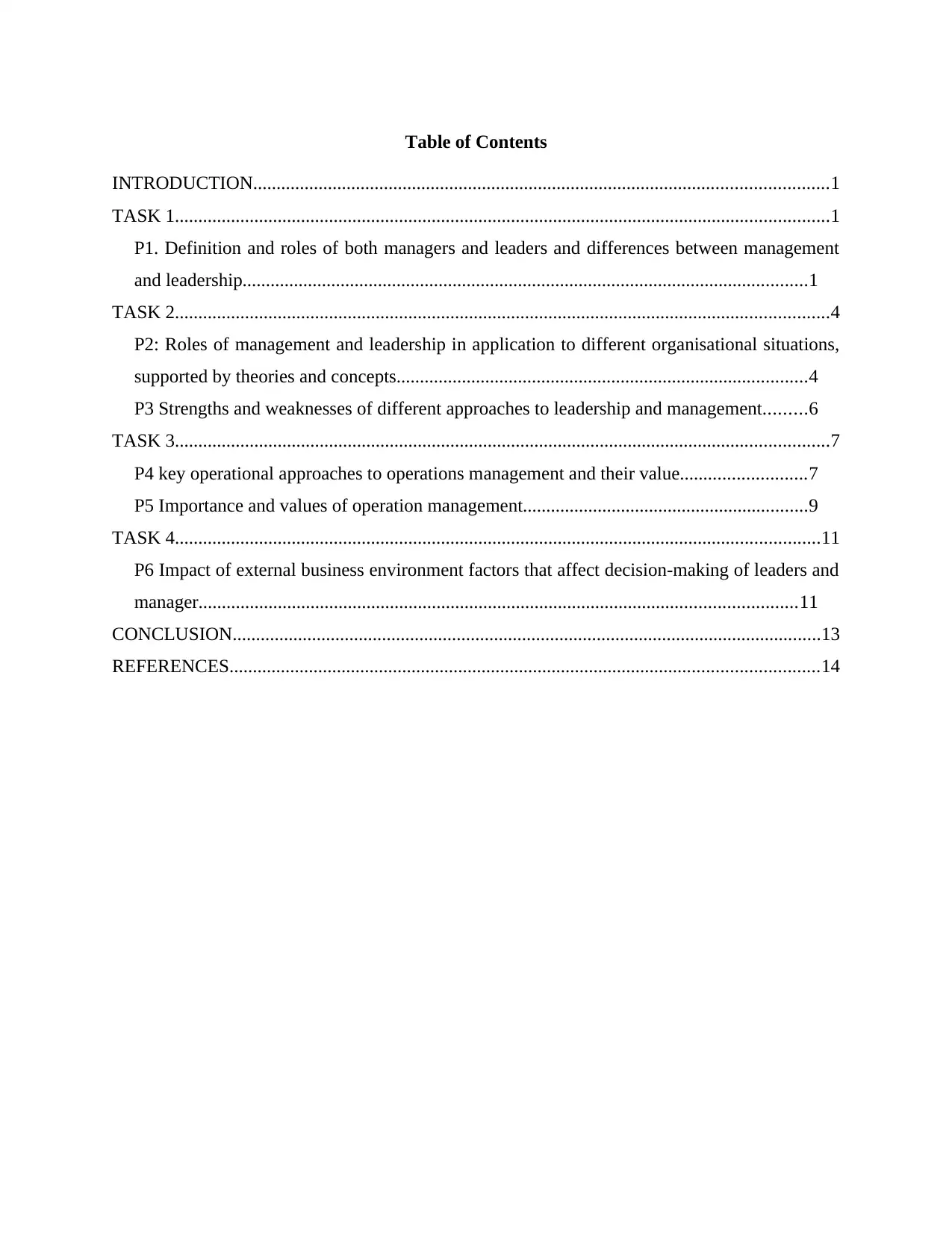
Table of Contents
INTRODUCTION...........................................................................................................................1
TASK 1............................................................................................................................................1
P1. Definition and roles of both managers and leaders and differences between management
and leadership.........................................................................................................................1
TASK 2............................................................................................................................................4
P2: Roles of management and leadership in application to different organisational situations,
supported by theories and concepts........................................................................................4
P3 Strengths and weaknesses of different approaches to leadership and management.........6
TASK 3............................................................................................................................................7
P4 key operational approaches to operations management and their value...........................7
P5 Importance and values of operation management.............................................................9
TASK 4..........................................................................................................................................11
P6 Impact of external business environment factors that affect decision-making of leaders and
manager................................................................................................................................11
CONCLUSION..............................................................................................................................13
REFERENCES..............................................................................................................................14
INTRODUCTION...........................................................................................................................1
TASK 1............................................................................................................................................1
P1. Definition and roles of both managers and leaders and differences between management
and leadership.........................................................................................................................1
TASK 2............................................................................................................................................4
P2: Roles of management and leadership in application to different organisational situations,
supported by theories and concepts........................................................................................4
P3 Strengths and weaknesses of different approaches to leadership and management.........6
TASK 3............................................................................................................................................7
P4 key operational approaches to operations management and their value...........................7
P5 Importance and values of operation management.............................................................9
TASK 4..........................................................................................................................................11
P6 Impact of external business environment factors that affect decision-making of leaders and
manager................................................................................................................................11
CONCLUSION..............................................................................................................................13
REFERENCES..............................................................................................................................14
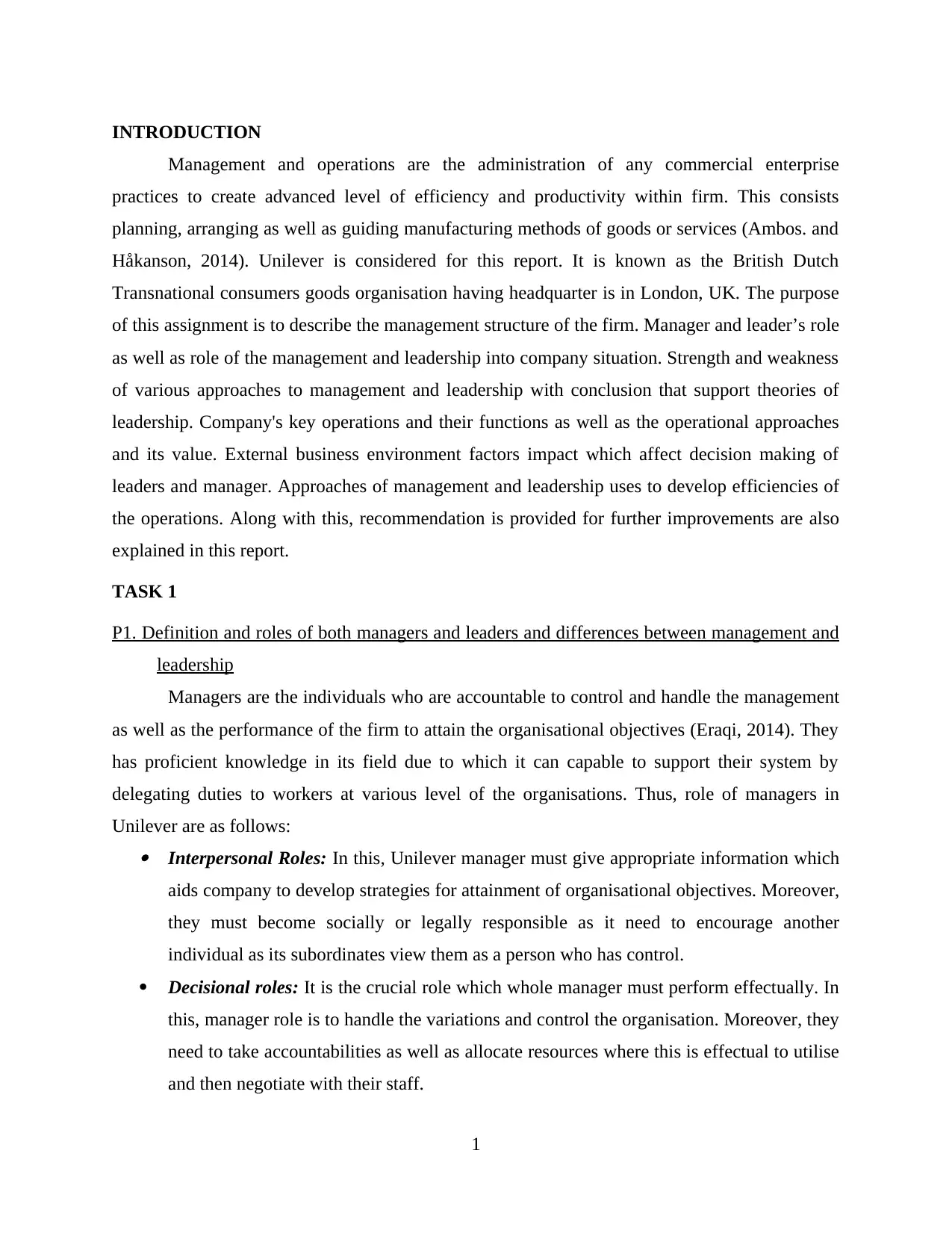
INTRODUCTION
Management and operations are the administration of any commercial enterprise
practices to create advanced level of efficiency and productivity within firm. This consists
planning, arranging as well as guiding manufacturing methods of goods or services (Ambos. and
Håkanson, 2014). Unilever is considered for this report. It is known as the British Dutch
Transnational consumers goods organisation having headquarter is in London, UK. The purpose
of this assignment is to describe the management structure of the firm. Manager and leader’s role
as well as role of the management and leadership into company situation. Strength and weakness
of various approaches to management and leadership with conclusion that support theories of
leadership. Company's key operations and their functions as well as the operational approaches
and its value. External business environment factors impact which affect decision making of
leaders and manager. Approaches of management and leadership uses to develop efficiencies of
the operations. Along with this, recommendation is provided for further improvements are also
explained in this report.
TASK 1
P1. Definition and roles of both managers and leaders and differences between management and
leadership
Managers are the individuals who are accountable to control and handle the management
as well as the performance of the firm to attain the organisational objectives (Eraqi, 2014). They
has proficient knowledge in its field due to which it can capable to support their system by
delegating duties to workers at various level of the organisations. Thus, role of managers in
Unilever are as follows: Interpersonal Roles: In this, Unilever manager must give appropriate information which
aids company to develop strategies for attainment of organisational objectives. Moreover,
they must become socially or legally responsible as it need to encourage another
individual as its subordinates view them as a person who has control.
Decisional roles: It is the crucial role which whole manager must perform effectually. In
this, manager role is to handle the variations and control the organisation. Moreover, they
need to take accountabilities as well as allocate resources where this is effectual to utilise
and then negotiate with their staff.
1
Management and operations are the administration of any commercial enterprise
practices to create advanced level of efficiency and productivity within firm. This consists
planning, arranging as well as guiding manufacturing methods of goods or services (Ambos. and
Håkanson, 2014). Unilever is considered for this report. It is known as the British Dutch
Transnational consumers goods organisation having headquarter is in London, UK. The purpose
of this assignment is to describe the management structure of the firm. Manager and leader’s role
as well as role of the management and leadership into company situation. Strength and weakness
of various approaches to management and leadership with conclusion that support theories of
leadership. Company's key operations and their functions as well as the operational approaches
and its value. External business environment factors impact which affect decision making of
leaders and manager. Approaches of management and leadership uses to develop efficiencies of
the operations. Along with this, recommendation is provided for further improvements are also
explained in this report.
TASK 1
P1. Definition and roles of both managers and leaders and differences between management and
leadership
Managers are the individuals who are accountable to control and handle the management
as well as the performance of the firm to attain the organisational objectives (Eraqi, 2014). They
has proficient knowledge in its field due to which it can capable to support their system by
delegating duties to workers at various level of the organisations. Thus, role of managers in
Unilever are as follows: Interpersonal Roles: In this, Unilever manager must give appropriate information which
aids company to develop strategies for attainment of organisational objectives. Moreover,
they must become socially or legally responsible as it need to encourage another
individual as its subordinates view them as a person who has control.
Decisional roles: It is the crucial role which whole manager must perform effectually. In
this, manager role is to handle the variations and control the organisation. Moreover, they
need to take accountabilities as well as allocate resources where this is effectual to utilise
and then negotiate with their staff.
1
⊘ This is a preview!⊘
Do you want full access?
Subscribe today to unlock all pages.

Trusted by 1+ million students worldwide
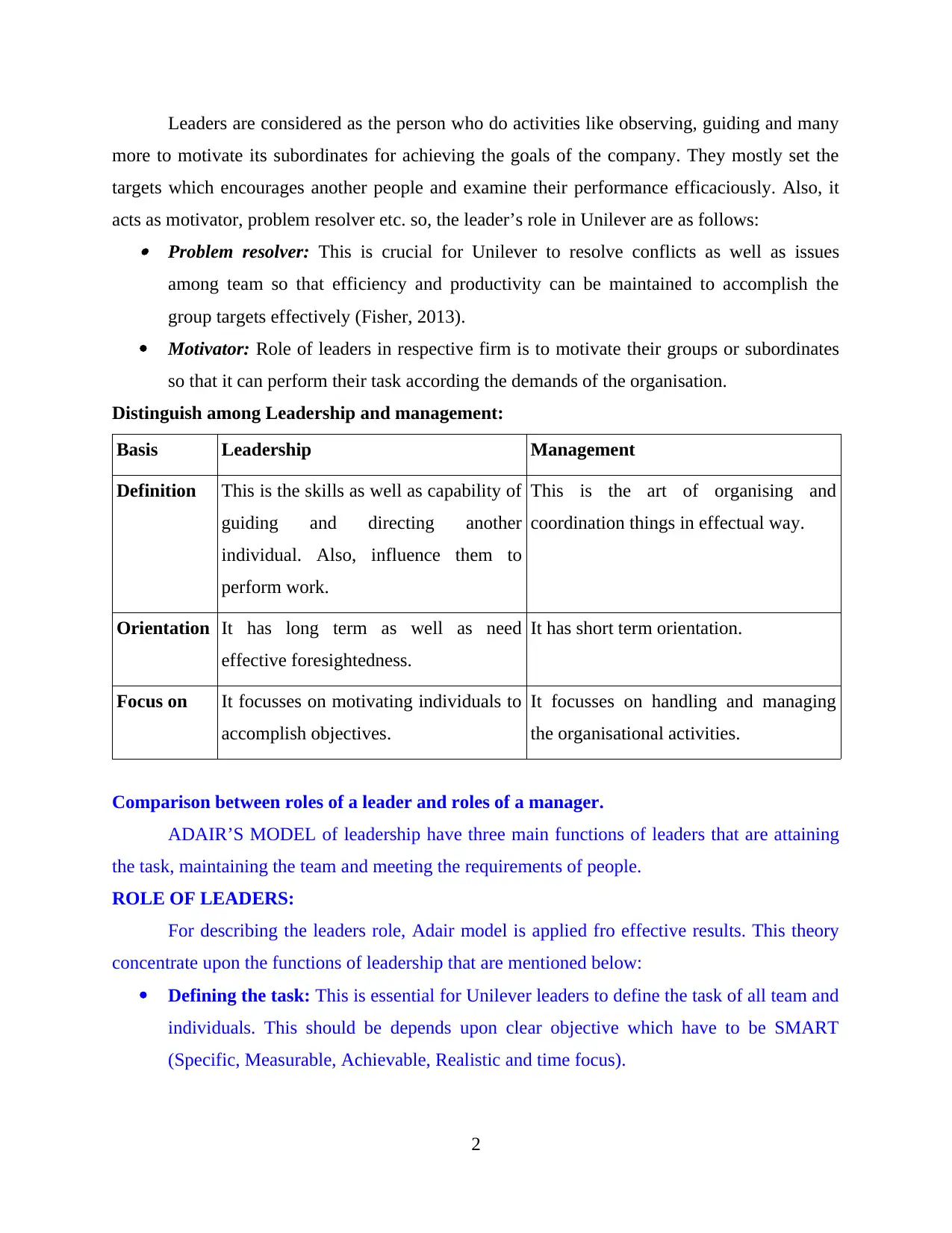
Leaders are considered as the person who do activities like observing, guiding and many
more to motivate its subordinates for achieving the goals of the company. They mostly set the
targets which encourages another people and examine their performance efficaciously. Also, it
acts as motivator, problem resolver etc. so, the leader’s role in Unilever are as follows: Problem resolver: This is crucial for Unilever to resolve conflicts as well as issues
among team so that efficiency and productivity can be maintained to accomplish the
group targets effectively (Fisher, 2013).
Motivator: Role of leaders in respective firm is to motivate their groups or subordinates
so that it can perform their task according the demands of the organisation.
Distinguish among Leadership and management:
Basis Leadership Management
Definition This is the skills as well as capability of
guiding and directing another
individual. Also, influence them to
perform work.
This is the art of organising and
coordination things in effectual way.
Orientation It has long term as well as need
effective foresightedness.
It has short term orientation.
Focus on It focusses on motivating individuals to
accomplish objectives.
It focusses on handling and managing
the organisational activities.
Comparison between roles of a leader and roles of a manager.
ADAIR’S MODEL of leadership have three main functions of leaders that are attaining
the task, maintaining the team and meeting the requirements of people.
ROLE OF LEADERS:
For describing the leaders role, Adair model is applied fro effective results. This theory
concentrate upon the functions of leadership that are mentioned below:
Defining the task: This is essential for Unilever leaders to define the task of all team and
individuals. This should be depends upon clear objective which have to be SMART
(Specific, Measurable, Achievable, Realistic and time focus).
2
more to motivate its subordinates for achieving the goals of the company. They mostly set the
targets which encourages another people and examine their performance efficaciously. Also, it
acts as motivator, problem resolver etc. so, the leader’s role in Unilever are as follows: Problem resolver: This is crucial for Unilever to resolve conflicts as well as issues
among team so that efficiency and productivity can be maintained to accomplish the
group targets effectively (Fisher, 2013).
Motivator: Role of leaders in respective firm is to motivate their groups or subordinates
so that it can perform their task according the demands of the organisation.
Distinguish among Leadership and management:
Basis Leadership Management
Definition This is the skills as well as capability of
guiding and directing another
individual. Also, influence them to
perform work.
This is the art of organising and
coordination things in effectual way.
Orientation It has long term as well as need
effective foresightedness.
It has short term orientation.
Focus on It focusses on motivating individuals to
accomplish objectives.
It focusses on handling and managing
the organisational activities.
Comparison between roles of a leader and roles of a manager.
ADAIR’S MODEL of leadership have three main functions of leaders that are attaining
the task, maintaining the team and meeting the requirements of people.
ROLE OF LEADERS:
For describing the leaders role, Adair model is applied fro effective results. This theory
concentrate upon the functions of leadership that are mentioned below:
Defining the task: This is essential for Unilever leaders to define the task of all team and
individuals. This should be depends upon clear objective which have to be SMART
(Specific, Measurable, Achievable, Realistic and time focus).
2
Paraphrase This Document
Need a fresh take? Get an instant paraphrase of this document with our AI Paraphraser
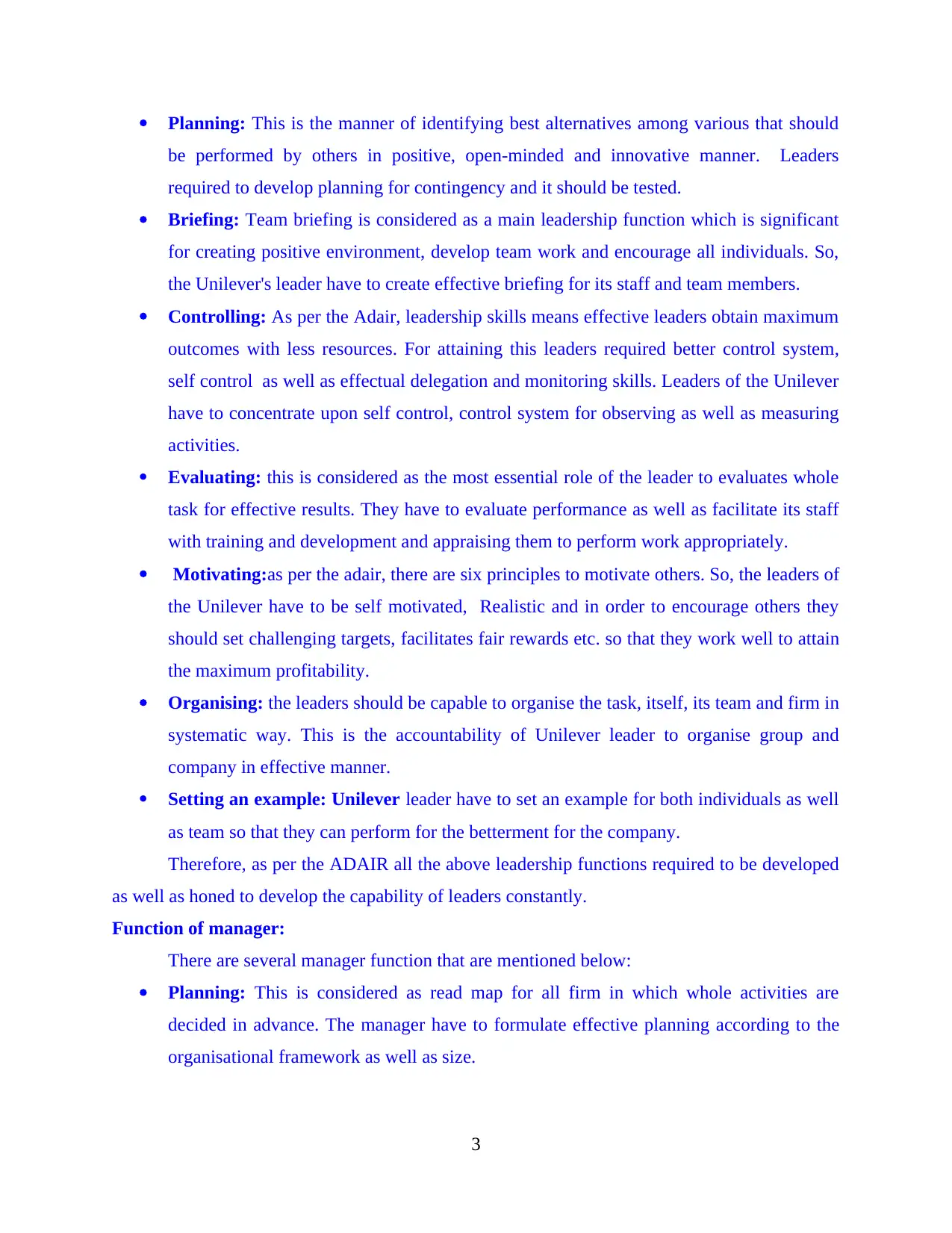
Planning: This is the manner of identifying best alternatives among various that should
be performed by others in positive, open-minded and innovative manner. Leaders
required to develop planning for contingency and it should be tested.
Briefing: Team briefing is considered as a main leadership function which is significant
for creating positive environment, develop team work and encourage all individuals. So,
the Unilever's leader have to create effective briefing for its staff and team members.
Controlling: As per the Adair, leadership skills means effective leaders obtain maximum
outcomes with less resources. For attaining this leaders required better control system,
self control as well as effectual delegation and monitoring skills. Leaders of the Unilever
have to concentrate upon self control, control system for observing as well as measuring
activities.
Evaluating: this is considered as the most essential role of the leader to evaluates whole
task for effective results. They have to evaluate performance as well as facilitate its staff
with training and development and appraising them to perform work appropriately.
Motivating:as per the adair, there are six principles to motivate others. So, the leaders of
the Unilever have to be self motivated, Realistic and in order to encourage others they
should set challenging targets, facilitates fair rewards etc. so that they work well to attain
the maximum profitability.
Organising: the leaders should be capable to organise the task, itself, its team and firm in
systematic way. This is the accountability of Unilever leader to organise group and
company in effective manner.
Setting an example: Unilever leader have to set an example for both individuals as well
as team so that they can perform for the betterment for the company.
Therefore, as per the ADAIR all the above leadership functions required to be developed
as well as honed to develop the capability of leaders constantly.
Function of manager:
There are several manager function that are mentioned below:
Planning: This is considered as read map for all firm in which whole activities are
decided in advance. The manager have to formulate effective planning according to the
organisational framework as well as size.
3
be performed by others in positive, open-minded and innovative manner. Leaders
required to develop planning for contingency and it should be tested.
Briefing: Team briefing is considered as a main leadership function which is significant
for creating positive environment, develop team work and encourage all individuals. So,
the Unilever's leader have to create effective briefing for its staff and team members.
Controlling: As per the Adair, leadership skills means effective leaders obtain maximum
outcomes with less resources. For attaining this leaders required better control system,
self control as well as effectual delegation and monitoring skills. Leaders of the Unilever
have to concentrate upon self control, control system for observing as well as measuring
activities.
Evaluating: this is considered as the most essential role of the leader to evaluates whole
task for effective results. They have to evaluate performance as well as facilitate its staff
with training and development and appraising them to perform work appropriately.
Motivating:as per the adair, there are six principles to motivate others. So, the leaders of
the Unilever have to be self motivated, Realistic and in order to encourage others they
should set challenging targets, facilitates fair rewards etc. so that they work well to attain
the maximum profitability.
Organising: the leaders should be capable to organise the task, itself, its team and firm in
systematic way. This is the accountability of Unilever leader to organise group and
company in effective manner.
Setting an example: Unilever leader have to set an example for both individuals as well
as team so that they can perform for the betterment for the company.
Therefore, as per the ADAIR all the above leadership functions required to be developed
as well as honed to develop the capability of leaders constantly.
Function of manager:
There are several manager function that are mentioned below:
Planning: This is considered as read map for all firm in which whole activities are
decided in advance. The manager have to formulate effective planning according to the
organisational framework as well as size.
3
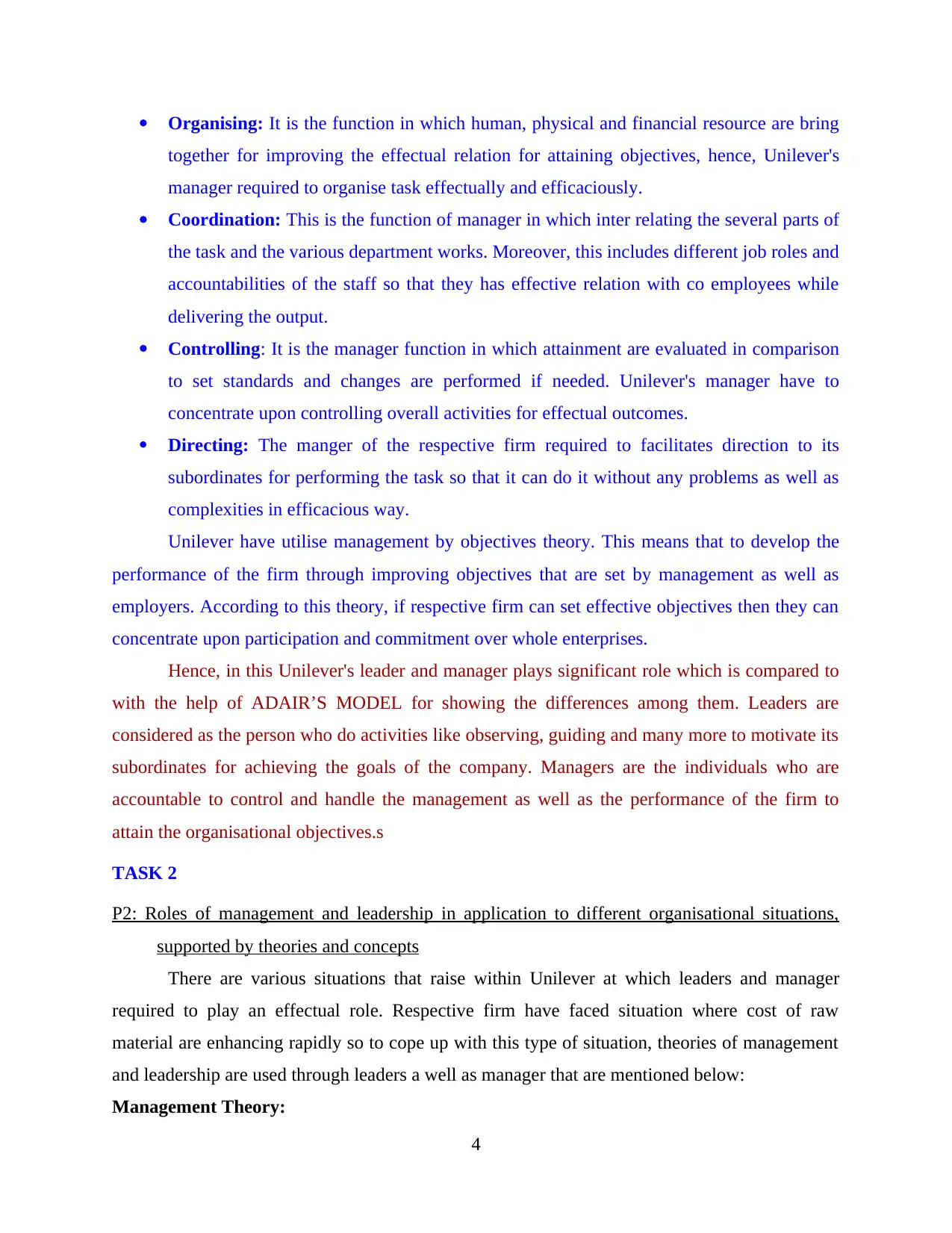
Organising: It is the function in which human, physical and financial resource are bring
together for improving the effectual relation for attaining objectives, hence, Unilever's
manager required to organise task effectually and efficaciously.
Coordination: This is the function of manager in which inter relating the several parts of
the task and the various department works. Moreover, this includes different job roles and
accountabilities of the staff so that they has effective relation with co employees while
delivering the output.
Controlling: It is the manager function in which attainment are evaluated in comparison
to set standards and changes are performed if needed. Unilever's manager have to
concentrate upon controlling overall activities for effectual outcomes.
Directing: The manger of the respective firm required to facilitates direction to its
subordinates for performing the task so that it can do it without any problems as well as
complexities in efficacious way.
Unilever have utilise management by objectives theory. This means that to develop the
performance of the firm through improving objectives that are set by management as well as
employers. According to this theory, if respective firm can set effective objectives then they can
concentrate upon participation and commitment over whole enterprises.
Hence, in this Unilever's leader and manager plays significant role which is compared to
with the help of ADAIR’S MODEL for showing the differences among them. Leaders are
considered as the person who do activities like observing, guiding and many more to motivate its
subordinates for achieving the goals of the company. Managers are the individuals who are
accountable to control and handle the management as well as the performance of the firm to
attain the organisational objectives.s
TASK 2
P2: Roles of management and leadership in application to different organisational situations,
supported by theories and concepts
There are various situations that raise within Unilever at which leaders and manager
required to play an effectual role. Respective firm have faced situation where cost of raw
material are enhancing rapidly so to cope up with this type of situation, theories of management
and leadership are used through leaders a well as manager that are mentioned below:
Management Theory:
4
together for improving the effectual relation for attaining objectives, hence, Unilever's
manager required to organise task effectually and efficaciously.
Coordination: This is the function of manager in which inter relating the several parts of
the task and the various department works. Moreover, this includes different job roles and
accountabilities of the staff so that they has effective relation with co employees while
delivering the output.
Controlling: It is the manager function in which attainment are evaluated in comparison
to set standards and changes are performed if needed. Unilever's manager have to
concentrate upon controlling overall activities for effectual outcomes.
Directing: The manger of the respective firm required to facilitates direction to its
subordinates for performing the task so that it can do it without any problems as well as
complexities in efficacious way.
Unilever have utilise management by objectives theory. This means that to develop the
performance of the firm through improving objectives that are set by management as well as
employers. According to this theory, if respective firm can set effective objectives then they can
concentrate upon participation and commitment over whole enterprises.
Hence, in this Unilever's leader and manager plays significant role which is compared to
with the help of ADAIR’S MODEL for showing the differences among them. Leaders are
considered as the person who do activities like observing, guiding and many more to motivate its
subordinates for achieving the goals of the company. Managers are the individuals who are
accountable to control and handle the management as well as the performance of the firm to
attain the organisational objectives.s
TASK 2
P2: Roles of management and leadership in application to different organisational situations,
supported by theories and concepts
There are various situations that raise within Unilever at which leaders and manager
required to play an effectual role. Respective firm have faced situation where cost of raw
material are enhancing rapidly so to cope up with this type of situation, theories of management
and leadership are used through leaders a well as manager that are mentioned below:
Management Theory:
4
⊘ This is a preview!⊘
Do you want full access?
Subscribe today to unlock all pages.

Trusted by 1+ million students worldwide
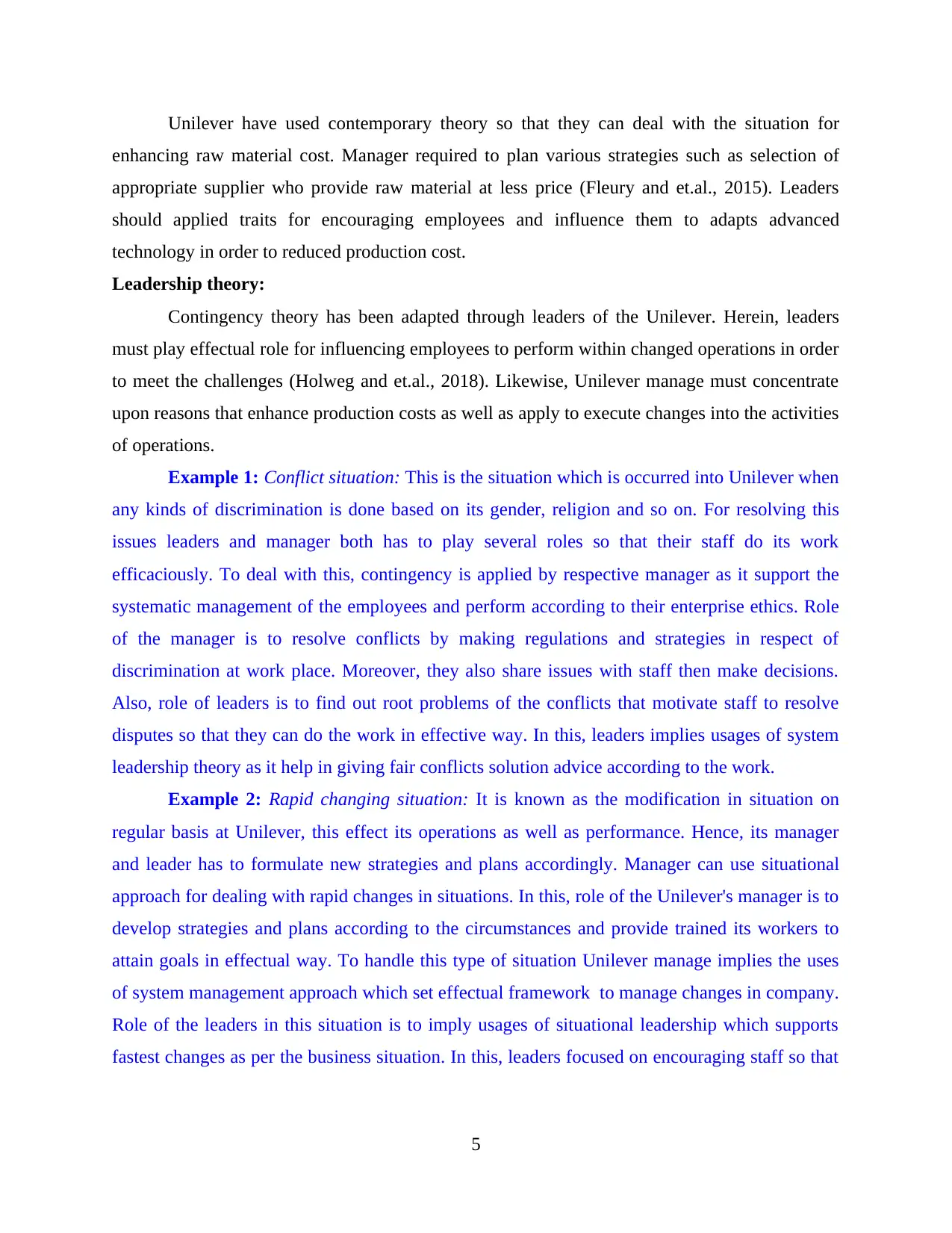
Unilever have used contemporary theory so that they can deal with the situation for
enhancing raw material cost. Manager required to plan various strategies such as selection of
appropriate supplier who provide raw material at less price (Fleury and et.al., 2015). Leaders
should applied traits for encouraging employees and influence them to adapts advanced
technology in order to reduced production cost.
Leadership theory:
Contingency theory has been adapted through leaders of the Unilever. Herein, leaders
must play effectual role for influencing employees to perform within changed operations in order
to meet the challenges (Holweg and et.al., 2018). Likewise, Unilever manage must concentrate
upon reasons that enhance production costs as well as apply to execute changes into the activities
of operations.
Example 1: Conflict situation: This is the situation which is occurred into Unilever when
any kinds of discrimination is done based on its gender, religion and so on. For resolving this
issues leaders and manager both has to play several roles so that their staff do its work
efficaciously. To deal with this, contingency is applied by respective manager as it support the
systematic management of the employees and perform according to their enterprise ethics. Role
of the manager is to resolve conflicts by making regulations and strategies in respect of
discrimination at work place. Moreover, they also share issues with staff then make decisions.
Also, role of leaders is to find out root problems of the conflicts that motivate staff to resolve
disputes so that they can do the work in effective way. In this, leaders implies usages of system
leadership theory as it help in giving fair conflicts solution advice according to the work.
Example 2: Rapid changing situation: It is known as the modification in situation on
regular basis at Unilever, this effect its operations as well as performance. Hence, its manager
and leader has to formulate new strategies and plans accordingly. Manager can use situational
approach for dealing with rapid changes in situations. In this, role of the Unilever's manager is to
develop strategies and plans according to the circumstances and provide trained its workers to
attain goals in effectual way. To handle this type of situation Unilever manage implies the uses
of system management approach which set effectual framework to manage changes in company.
Role of the leaders in this situation is to imply usages of situational leadership which supports
fastest changes as per the business situation. In this, leaders focused on encouraging staff so that
5
enhancing raw material cost. Manager required to plan various strategies such as selection of
appropriate supplier who provide raw material at less price (Fleury and et.al., 2015). Leaders
should applied traits for encouraging employees and influence them to adapts advanced
technology in order to reduced production cost.
Leadership theory:
Contingency theory has been adapted through leaders of the Unilever. Herein, leaders
must play effectual role for influencing employees to perform within changed operations in order
to meet the challenges (Holweg and et.al., 2018). Likewise, Unilever manage must concentrate
upon reasons that enhance production costs as well as apply to execute changes into the activities
of operations.
Example 1: Conflict situation: This is the situation which is occurred into Unilever when
any kinds of discrimination is done based on its gender, religion and so on. For resolving this
issues leaders and manager both has to play several roles so that their staff do its work
efficaciously. To deal with this, contingency is applied by respective manager as it support the
systematic management of the employees and perform according to their enterprise ethics. Role
of the manager is to resolve conflicts by making regulations and strategies in respect of
discrimination at work place. Moreover, they also share issues with staff then make decisions.
Also, role of leaders is to find out root problems of the conflicts that motivate staff to resolve
disputes so that they can do the work in effective way. In this, leaders implies usages of system
leadership theory as it help in giving fair conflicts solution advice according to the work.
Example 2: Rapid changing situation: It is known as the modification in situation on
regular basis at Unilever, this effect its operations as well as performance. Hence, its manager
and leader has to formulate new strategies and plans accordingly. Manager can use situational
approach for dealing with rapid changes in situations. In this, role of the Unilever's manager is to
develop strategies and plans according to the circumstances and provide trained its workers to
attain goals in effectual way. To handle this type of situation Unilever manage implies the uses
of system management approach which set effectual framework to manage changes in company.
Role of the leaders in this situation is to imply usages of situational leadership which supports
fastest changes as per the business situation. In this, leaders focused on encouraging staff so that
5
Paraphrase This Document
Need a fresh take? Get an instant paraphrase of this document with our AI Paraphraser
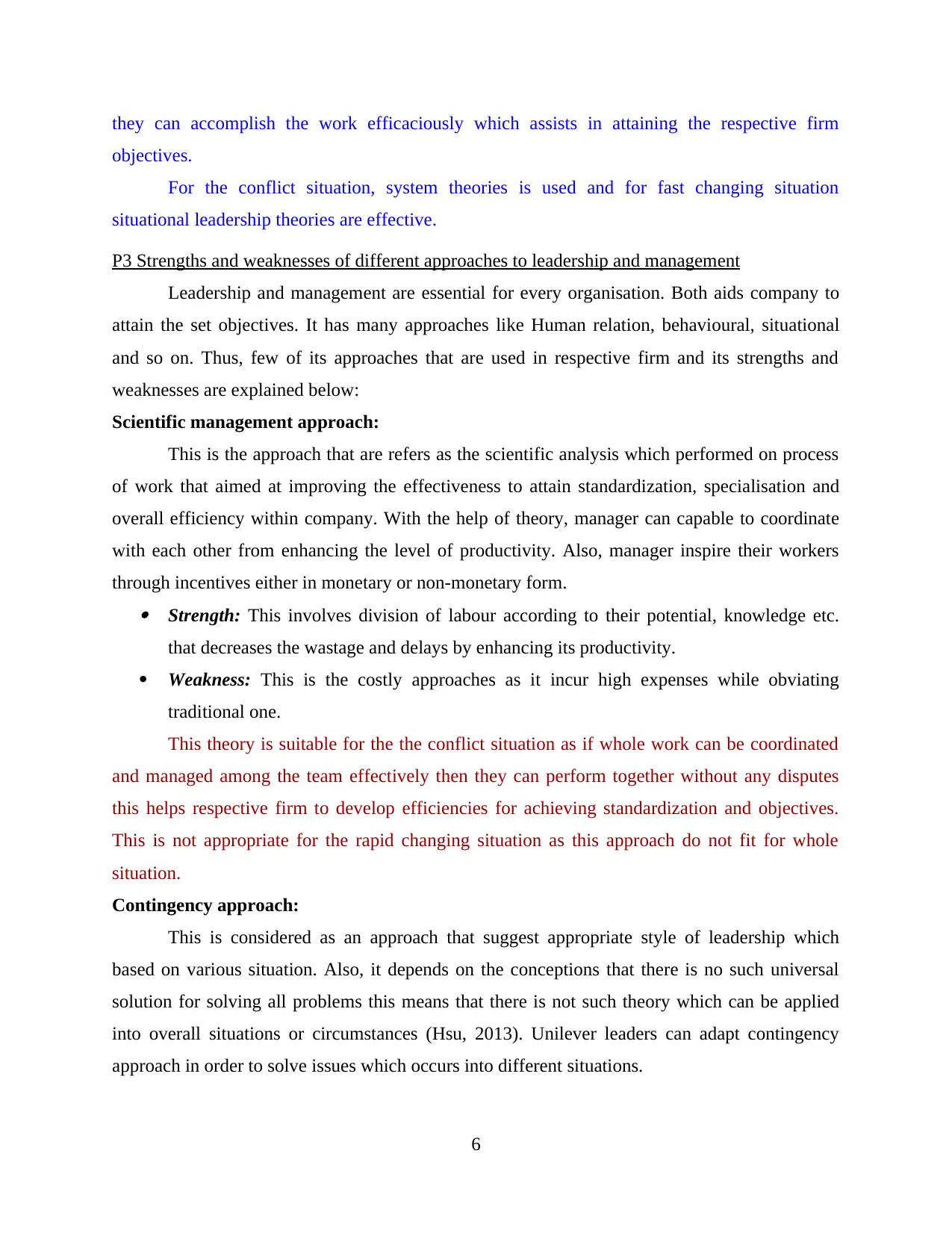
they can accomplish the work efficaciously which assists in attaining the respective firm
objectives.
For the conflict situation, system theories is used and for fast changing situation
situational leadership theories are effective.
P3 Strengths and weaknesses of different approaches to leadership and management
Leadership and management are essential for every organisation. Both aids company to
attain the set objectives. It has many approaches like Human relation, behavioural, situational
and so on. Thus, few of its approaches that are used in respective firm and its strengths and
weaknesses are explained below:
Scientific management approach:
This is the approach that are refers as the scientific analysis which performed on process
of work that aimed at improving the effectiveness to attain standardization, specialisation and
overall efficiency within company. With the help of theory, manager can capable to coordinate
with each other from enhancing the level of productivity. Also, manager inspire their workers
through incentives either in monetary or non-monetary form. Strength: This involves division of labour according to their potential, knowledge etc.
that decreases the wastage and delays by enhancing its productivity.
Weakness: This is the costly approaches as it incur high expenses while obviating
traditional one.
This theory is suitable for the the conflict situation as if whole work can be coordinated
and managed among the team effectively then they can perform together without any disputes
this helps respective firm to develop efficiencies for achieving standardization and objectives.
This is not appropriate for the rapid changing situation as this approach do not fit for whole
situation.
Contingency approach:
This is considered as an approach that suggest appropriate style of leadership which
based on various situation. Also, it depends on the conceptions that there is no such universal
solution for solving all problems this means that there is not such theory which can be applied
into overall situations or circumstances (Hsu, 2013). Unilever leaders can adapt contingency
approach in order to solve issues which occurs into different situations.
6
objectives.
For the conflict situation, system theories is used and for fast changing situation
situational leadership theories are effective.
P3 Strengths and weaknesses of different approaches to leadership and management
Leadership and management are essential for every organisation. Both aids company to
attain the set objectives. It has many approaches like Human relation, behavioural, situational
and so on. Thus, few of its approaches that are used in respective firm and its strengths and
weaknesses are explained below:
Scientific management approach:
This is the approach that are refers as the scientific analysis which performed on process
of work that aimed at improving the effectiveness to attain standardization, specialisation and
overall efficiency within company. With the help of theory, manager can capable to coordinate
with each other from enhancing the level of productivity. Also, manager inspire their workers
through incentives either in monetary or non-monetary form. Strength: This involves division of labour according to their potential, knowledge etc.
that decreases the wastage and delays by enhancing its productivity.
Weakness: This is the costly approaches as it incur high expenses while obviating
traditional one.
This theory is suitable for the the conflict situation as if whole work can be coordinated
and managed among the team effectively then they can perform together without any disputes
this helps respective firm to develop efficiencies for achieving standardization and objectives.
This is not appropriate for the rapid changing situation as this approach do not fit for whole
situation.
Contingency approach:
This is considered as an approach that suggest appropriate style of leadership which
based on various situation. Also, it depends on the conceptions that there is no such universal
solution for solving all problems this means that there is not such theory which can be applied
into overall situations or circumstances (Hsu, 2013). Unilever leaders can adapt contingency
approach in order to solve issues which occurs into different situations.
6
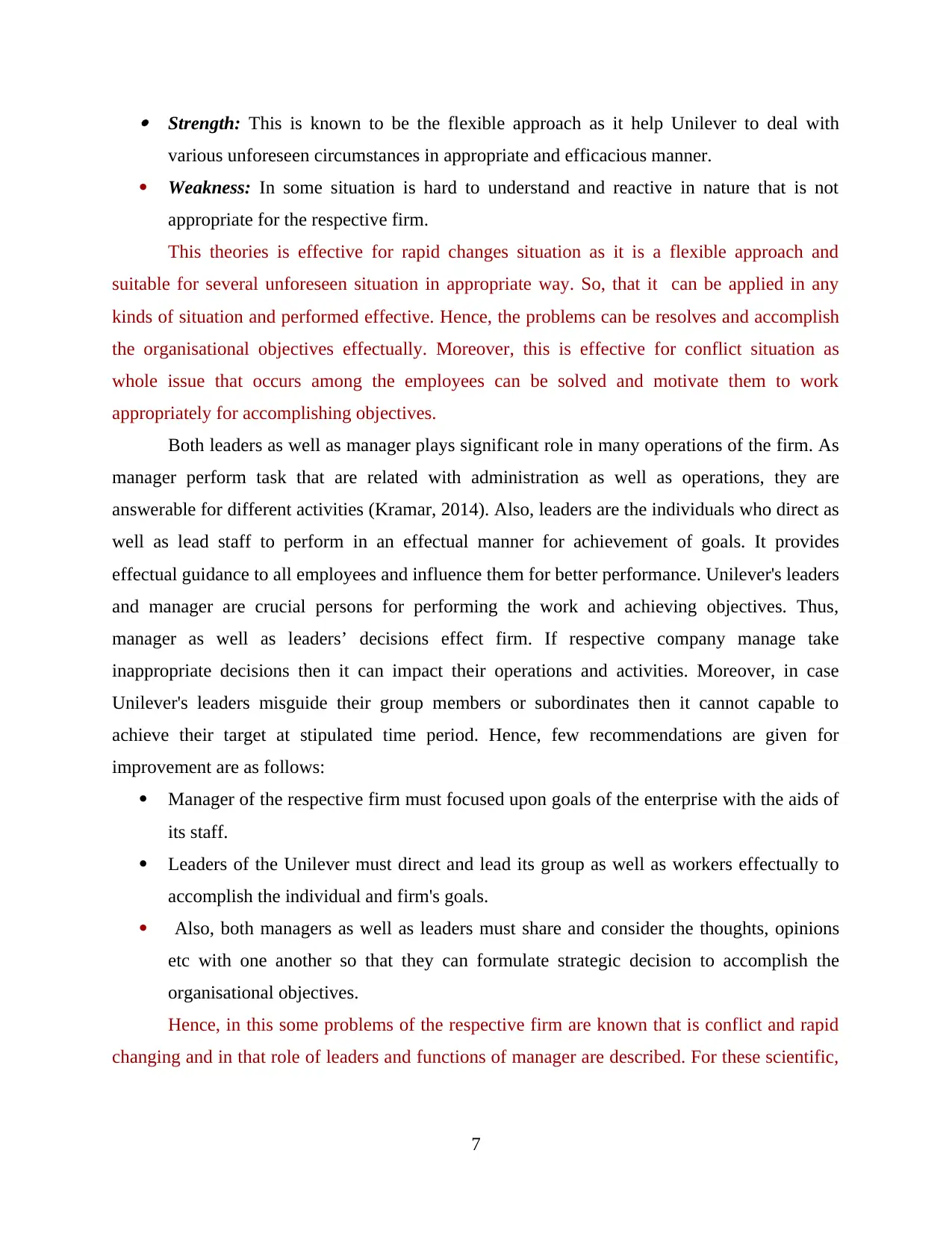
Strength: This is known to be the flexible approach as it help Unilever to deal with
various unforeseen circumstances in appropriate and efficacious manner.
Weakness: In some situation is hard to understand and reactive in nature that is not
appropriate for the respective firm.
This theories is effective for rapid changes situation as it is a flexible approach and
suitable for several unforeseen situation in appropriate way. So, that it can be applied in any
kinds of situation and performed effective. Hence, the problems can be resolves and accomplish
the organisational objectives effectually. Moreover, this is effective for conflict situation as
whole issue that occurs among the employees can be solved and motivate them to work
appropriately for accomplishing objectives.
Both leaders as well as manager plays significant role in many operations of the firm. As
manager perform task that are related with administration as well as operations, they are
answerable for different activities (Kramar, 2014). Also, leaders are the individuals who direct as
well as lead staff to perform in an effectual manner for achievement of goals. It provides
effectual guidance to all employees and influence them for better performance. Unilever's leaders
and manager are crucial persons for performing the work and achieving objectives. Thus,
manager as well as leaders’ decisions effect firm. If respective company manage take
inappropriate decisions then it can impact their operations and activities. Moreover, in case
Unilever's leaders misguide their group members or subordinates then it cannot capable to
achieve their target at stipulated time period. Hence, few recommendations are given for
improvement are as follows:
Manager of the respective firm must focused upon goals of the enterprise with the aids of
its staff.
Leaders of the Unilever must direct and lead its group as well as workers effectually to
accomplish the individual and firm's goals.
Also, both managers as well as leaders must share and consider the thoughts, opinions
etc with one another so that they can formulate strategic decision to accomplish the
organisational objectives.
Hence, in this some problems of the respective firm are known that is conflict and rapid
changing and in that role of leaders and functions of manager are described. For these scientific,
7
various unforeseen circumstances in appropriate and efficacious manner.
Weakness: In some situation is hard to understand and reactive in nature that is not
appropriate for the respective firm.
This theories is effective for rapid changes situation as it is a flexible approach and
suitable for several unforeseen situation in appropriate way. So, that it can be applied in any
kinds of situation and performed effective. Hence, the problems can be resolves and accomplish
the organisational objectives effectually. Moreover, this is effective for conflict situation as
whole issue that occurs among the employees can be solved and motivate them to work
appropriately for accomplishing objectives.
Both leaders as well as manager plays significant role in many operations of the firm. As
manager perform task that are related with administration as well as operations, they are
answerable for different activities (Kramar, 2014). Also, leaders are the individuals who direct as
well as lead staff to perform in an effectual manner for achievement of goals. It provides
effectual guidance to all employees and influence them for better performance. Unilever's leaders
and manager are crucial persons for performing the work and achieving objectives. Thus,
manager as well as leaders’ decisions effect firm. If respective company manage take
inappropriate decisions then it can impact their operations and activities. Moreover, in case
Unilever's leaders misguide their group members or subordinates then it cannot capable to
achieve their target at stipulated time period. Hence, few recommendations are given for
improvement are as follows:
Manager of the respective firm must focused upon goals of the enterprise with the aids of
its staff.
Leaders of the Unilever must direct and lead its group as well as workers effectually to
accomplish the individual and firm's goals.
Also, both managers as well as leaders must share and consider the thoughts, opinions
etc with one another so that they can formulate strategic decision to accomplish the
organisational objectives.
Hence, in this some problems of the respective firm are known that is conflict and rapid
changing and in that role of leaders and functions of manager are described. For these scientific,
7
⊘ This is a preview!⊘
Do you want full access?
Subscribe today to unlock all pages.

Trusted by 1+ million students worldwide
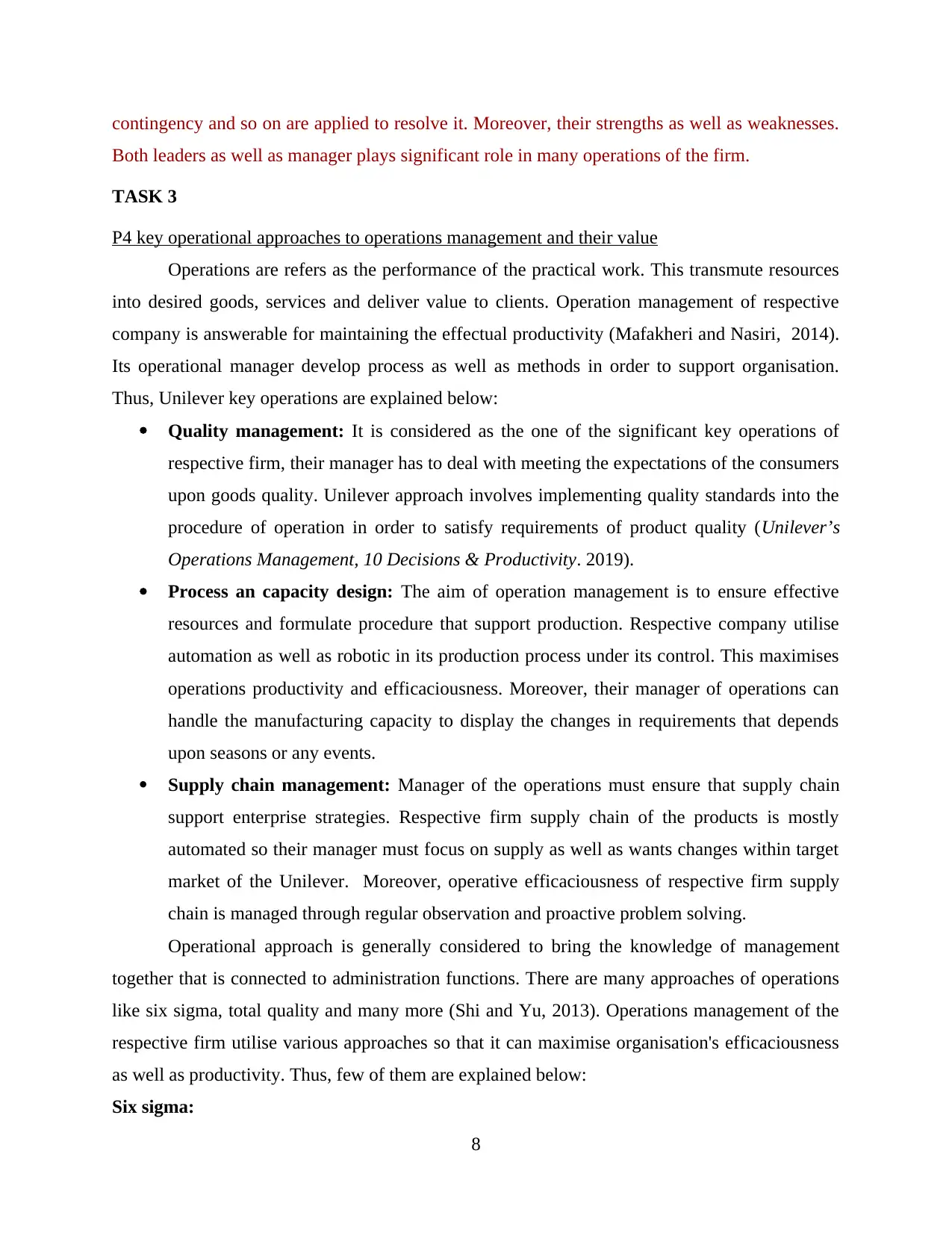
contingency and so on are applied to resolve it. Moreover, their strengths as well as weaknesses.
Both leaders as well as manager plays significant role in many operations of the firm.
TASK 3
P4 key operational approaches to operations management and their value
Operations are refers as the performance of the practical work. This transmute resources
into desired goods, services and deliver value to clients. Operation management of respective
company is answerable for maintaining the effectual productivity (Mafakheri and Nasiri, 2014).
Its operational manager develop process as well as methods in order to support organisation.
Thus, Unilever key operations are explained below:
Quality management: It is considered as the one of the significant key operations of
respective firm, their manager has to deal with meeting the expectations of the consumers
upon goods quality. Unilever approach involves implementing quality standards into the
procedure of operation in order to satisfy requirements of product quality (Unilever’s
Operations Management, 10 Decisions & Productivity. 2019).
Process an capacity design: The aim of operation management is to ensure effective
resources and formulate procedure that support production. Respective company utilise
automation as well as robotic in its production process under its control. This maximises
operations productivity and efficaciousness. Moreover, their manager of operations can
handle the manufacturing capacity to display the changes in requirements that depends
upon seasons or any events.
Supply chain management: Manager of the operations must ensure that supply chain
support enterprise strategies. Respective firm supply chain of the products is mostly
automated so their manager must focus on supply as well as wants changes within target
market of the Unilever. Moreover, operative efficaciousness of respective firm supply
chain is managed through regular observation and proactive problem solving.
Operational approach is generally considered to bring the knowledge of management
together that is connected to administration functions. There are many approaches of operations
like six sigma, total quality and many more (Shi and Yu, 2013). Operations management of the
respective firm utilise various approaches so that it can maximise organisation's efficaciousness
as well as productivity. Thus, few of them are explained below:
Six sigma:
8
Both leaders as well as manager plays significant role in many operations of the firm.
TASK 3
P4 key operational approaches to operations management and their value
Operations are refers as the performance of the practical work. This transmute resources
into desired goods, services and deliver value to clients. Operation management of respective
company is answerable for maintaining the effectual productivity (Mafakheri and Nasiri, 2014).
Its operational manager develop process as well as methods in order to support organisation.
Thus, Unilever key operations are explained below:
Quality management: It is considered as the one of the significant key operations of
respective firm, their manager has to deal with meeting the expectations of the consumers
upon goods quality. Unilever approach involves implementing quality standards into the
procedure of operation in order to satisfy requirements of product quality (Unilever’s
Operations Management, 10 Decisions & Productivity. 2019).
Process an capacity design: The aim of operation management is to ensure effective
resources and formulate procedure that support production. Respective company utilise
automation as well as robotic in its production process under its control. This maximises
operations productivity and efficaciousness. Moreover, their manager of operations can
handle the manufacturing capacity to display the changes in requirements that depends
upon seasons or any events.
Supply chain management: Manager of the operations must ensure that supply chain
support enterprise strategies. Respective firm supply chain of the products is mostly
automated so their manager must focus on supply as well as wants changes within target
market of the Unilever. Moreover, operative efficaciousness of respective firm supply
chain is managed through regular observation and proactive problem solving.
Operational approach is generally considered to bring the knowledge of management
together that is connected to administration functions. There are many approaches of operations
like six sigma, total quality and many more (Shi and Yu, 2013). Operations management of the
respective firm utilise various approaches so that it can maximise organisation's efficaciousness
as well as productivity. Thus, few of them are explained below:
Six sigma:
8
Paraphrase This Document
Need a fresh take? Get an instant paraphrase of this document with our AI Paraphraser
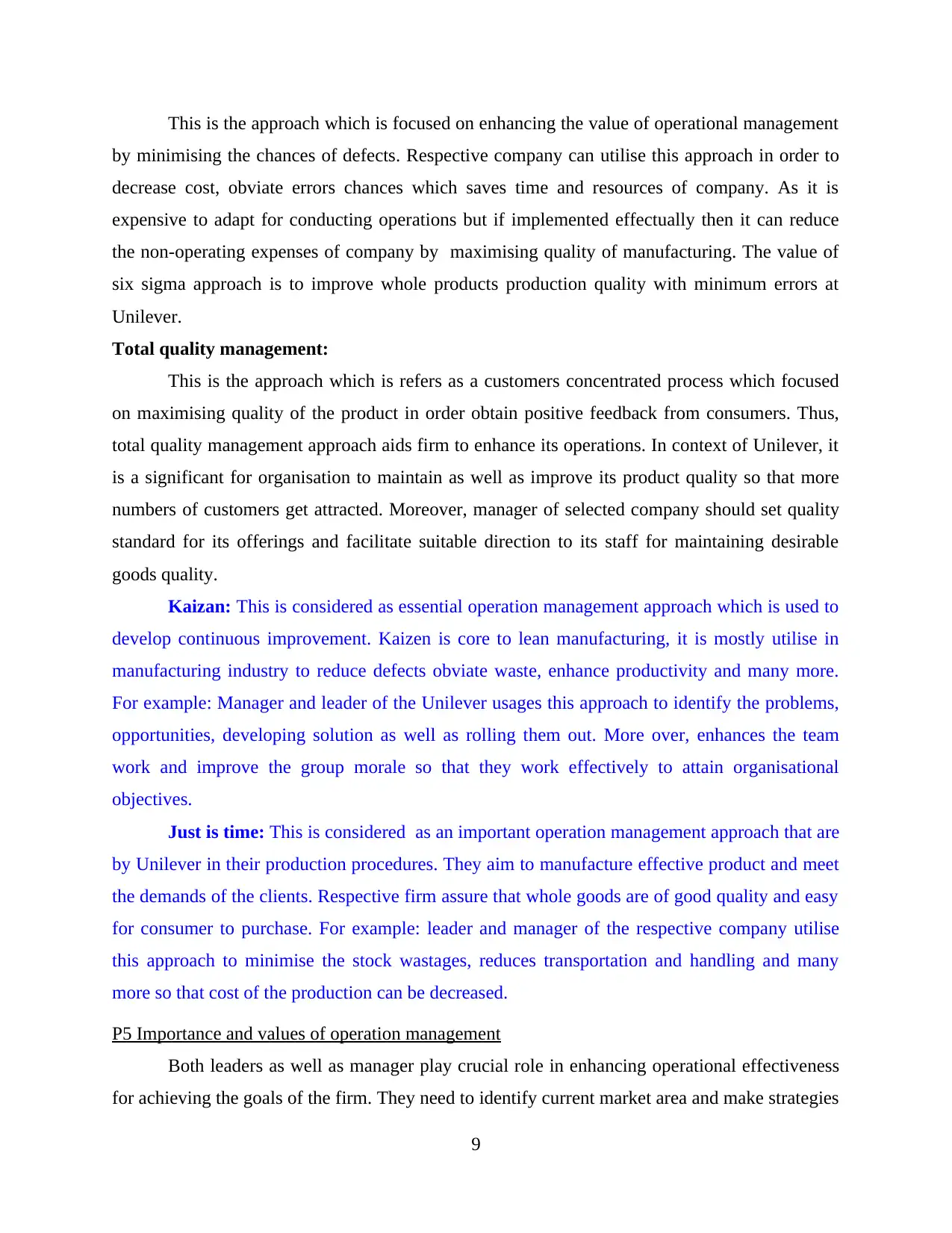
This is the approach which is focused on enhancing the value of operational management
by minimising the chances of defects. Respective company can utilise this approach in order to
decrease cost, obviate errors chances which saves time and resources of company. As it is
expensive to adapt for conducting operations but if implemented effectually then it can reduce
the non-operating expenses of company by maximising quality of manufacturing. The value of
six sigma approach is to improve whole products production quality with minimum errors at
Unilever.
Total quality management:
This is the approach which is refers as a customers concentrated process which focused
on maximising quality of the product in order obtain positive feedback from consumers. Thus,
total quality management approach aids firm to enhance its operations. In context of Unilever, it
is a significant for organisation to maintain as well as improve its product quality so that more
numbers of customers get attracted. Moreover, manager of selected company should set quality
standard for its offerings and facilitate suitable direction to its staff for maintaining desirable
goods quality.
Kaizan: This is considered as essential operation management approach which is used to
develop continuous improvement. Kaizen is core to lean manufacturing, it is mostly utilise in
manufacturing industry to reduce defects obviate waste, enhance productivity and many more.
For example: Manager and leader of the Unilever usages this approach to identify the problems,
opportunities, developing solution as well as rolling them out. More over, enhances the team
work and improve the group morale so that they work effectively to attain organisational
objectives.
Just is time: This is considered as an important operation management approach that are
by Unilever in their production procedures. They aim to manufacture effective product and meet
the demands of the clients. Respective firm assure that whole goods are of good quality and easy
for consumer to purchase. For example: leader and manager of the respective company utilise
this approach to minimise the stock wastages, reduces transportation and handling and many
more so that cost of the production can be decreased.
P5 Importance and values of operation management
Both leaders as well as manager play crucial role in enhancing operational effectiveness
for achieving the goals of the firm. They need to identify current market area and make strategies
9
by minimising the chances of defects. Respective company can utilise this approach in order to
decrease cost, obviate errors chances which saves time and resources of company. As it is
expensive to adapt for conducting operations but if implemented effectually then it can reduce
the non-operating expenses of company by maximising quality of manufacturing. The value of
six sigma approach is to improve whole products production quality with minimum errors at
Unilever.
Total quality management:
This is the approach which is refers as a customers concentrated process which focused
on maximising quality of the product in order obtain positive feedback from consumers. Thus,
total quality management approach aids firm to enhance its operations. In context of Unilever, it
is a significant for organisation to maintain as well as improve its product quality so that more
numbers of customers get attracted. Moreover, manager of selected company should set quality
standard for its offerings and facilitate suitable direction to its staff for maintaining desirable
goods quality.
Kaizan: This is considered as essential operation management approach which is used to
develop continuous improvement. Kaizen is core to lean manufacturing, it is mostly utilise in
manufacturing industry to reduce defects obviate waste, enhance productivity and many more.
For example: Manager and leader of the Unilever usages this approach to identify the problems,
opportunities, developing solution as well as rolling them out. More over, enhances the team
work and improve the group morale so that they work effectively to attain organisational
objectives.
Just is time: This is considered as an important operation management approach that are
by Unilever in their production procedures. They aim to manufacture effective product and meet
the demands of the clients. Respective firm assure that whole goods are of good quality and easy
for consumer to purchase. For example: leader and manager of the respective company utilise
this approach to minimise the stock wastages, reduces transportation and handling and many
more so that cost of the production can be decreased.
P5 Importance and values of operation management
Both leaders as well as manager play crucial role in enhancing operational effectiveness
for achieving the goals of the firm. They need to identify current market area and make strategies
9
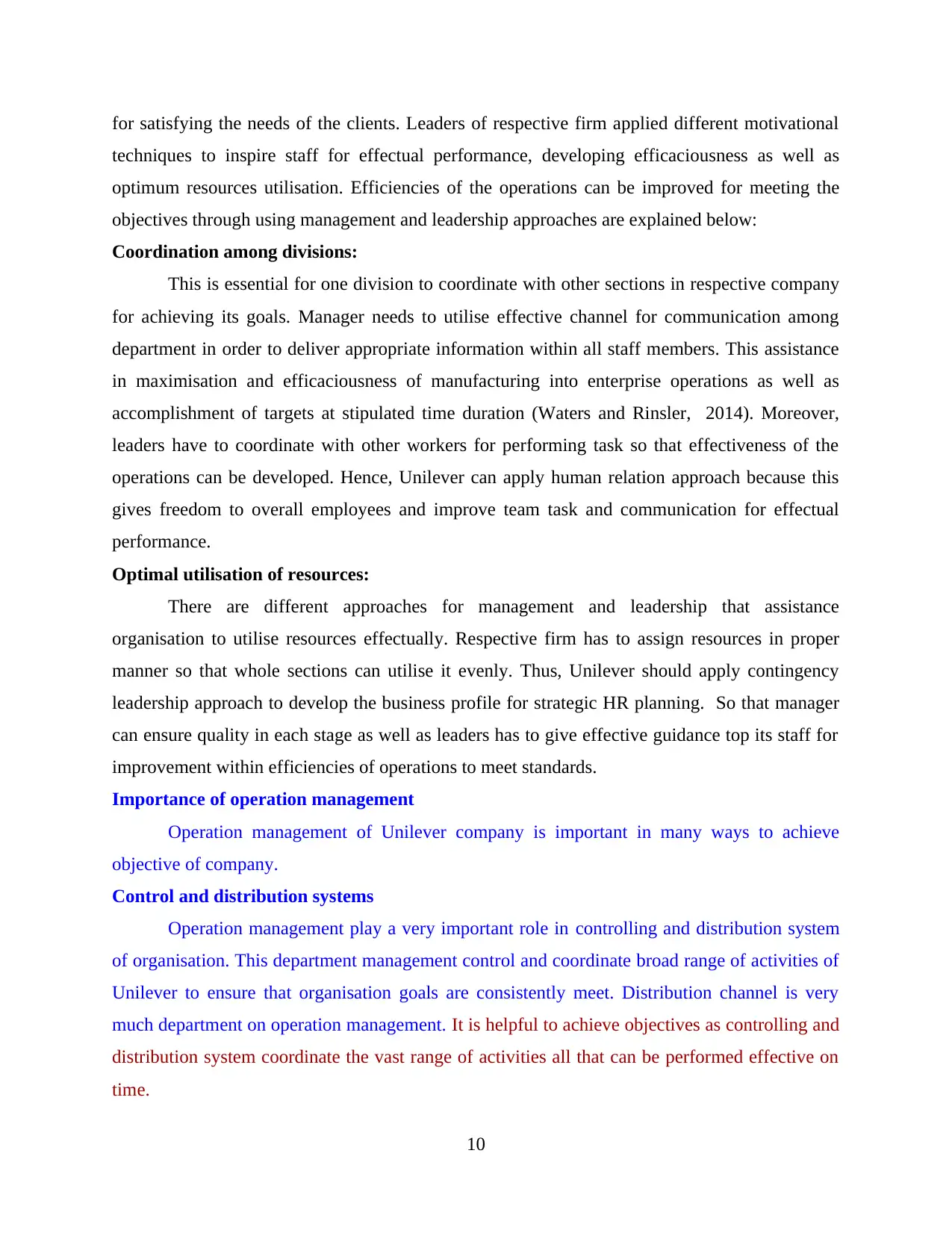
for satisfying the needs of the clients. Leaders of respective firm applied different motivational
techniques to inspire staff for effectual performance, developing efficaciousness as well as
optimum resources utilisation. Efficiencies of the operations can be improved for meeting the
objectives through using management and leadership approaches are explained below:
Coordination among divisions:
This is essential for one division to coordinate with other sections in respective company
for achieving its goals. Manager needs to utilise effective channel for communication among
department in order to deliver appropriate information within all staff members. This assistance
in maximisation and efficaciousness of manufacturing into enterprise operations as well as
accomplishment of targets at stipulated time duration (Waters and Rinsler, 2014). Moreover,
leaders have to coordinate with other workers for performing task so that effectiveness of the
operations can be developed. Hence, Unilever can apply human relation approach because this
gives freedom to overall employees and improve team task and communication for effectual
performance.
Optimal utilisation of resources:
There are different approaches for management and leadership that assistance
organisation to utilise resources effectually. Respective firm has to assign resources in proper
manner so that whole sections can utilise it evenly. Thus, Unilever should apply contingency
leadership approach to develop the business profile for strategic HR planning. So that manager
can ensure quality in each stage as well as leaders has to give effective guidance top its staff for
improvement within efficiencies of operations to meet standards.
Importance of operation management
Operation management of Unilever company is important in many ways to achieve
objective of company.
Control and distribution systems
Operation management play a very important role in controlling and distribution system
of organisation. This department management control and coordinate broad range of activities of
Unilever to ensure that organisation goals are consistently meet. Distribution channel is very
much department on operation management. It is helpful to achieve objectives as controlling and
distribution system coordinate the vast range of activities all that can be performed effective on
time.
10
techniques to inspire staff for effectual performance, developing efficaciousness as well as
optimum resources utilisation. Efficiencies of the operations can be improved for meeting the
objectives through using management and leadership approaches are explained below:
Coordination among divisions:
This is essential for one division to coordinate with other sections in respective company
for achieving its goals. Manager needs to utilise effective channel for communication among
department in order to deliver appropriate information within all staff members. This assistance
in maximisation and efficaciousness of manufacturing into enterprise operations as well as
accomplishment of targets at stipulated time duration (Waters and Rinsler, 2014). Moreover,
leaders have to coordinate with other workers for performing task so that effectiveness of the
operations can be developed. Hence, Unilever can apply human relation approach because this
gives freedom to overall employees and improve team task and communication for effectual
performance.
Optimal utilisation of resources:
There are different approaches for management and leadership that assistance
organisation to utilise resources effectually. Respective firm has to assign resources in proper
manner so that whole sections can utilise it evenly. Thus, Unilever should apply contingency
leadership approach to develop the business profile for strategic HR planning. So that manager
can ensure quality in each stage as well as leaders has to give effective guidance top its staff for
improvement within efficiencies of operations to meet standards.
Importance of operation management
Operation management of Unilever company is important in many ways to achieve
objective of company.
Control and distribution systems
Operation management play a very important role in controlling and distribution system
of organisation. This department management control and coordinate broad range of activities of
Unilever to ensure that organisation goals are consistently meet. Distribution channel is very
much department on operation management. It is helpful to achieve objectives as controlling and
distribution system coordinate the vast range of activities all that can be performed effective on
time.
10
⊘ This is a preview!⊘
Do you want full access?
Subscribe today to unlock all pages.

Trusted by 1+ million students worldwide
1 out of 19
Related Documents
Your All-in-One AI-Powered Toolkit for Academic Success.
+13062052269
info@desklib.com
Available 24*7 on WhatsApp / Email
![[object Object]](/_next/static/media/star-bottom.7253800d.svg)
Unlock your academic potential
Copyright © 2020–2026 A2Z Services. All Rights Reserved. Developed and managed by ZUCOL.





